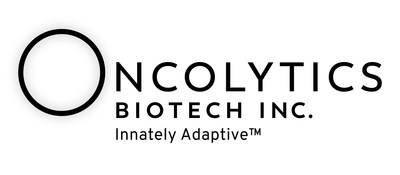Oncolytics and SOLTI Report Clinical Synergy of Pelareorep with Checkpoint Inhibitors at the 2020 San Antonio Breast Cancer Symposium
Rhea-AI Summary
Oncolytics Biotech announced significant findings from the AWARE-1 study at the San Antonio Breast Cancer Symposium, showing that pelareorep substantially increases the CelTIL score and PD-L1 expression in patients with early-stage breast cancer. Seventy-two percent of patients experienced increased CelTIL, while PD-L1 expression rose over 105-fold, enhancing the potential for immunotherapy. The study's results suggest pelareorep can synergize with checkpoint inhibitors, potentially improving treatment outcomes and expanding patient eligibility for these therapies.
Positive
- 72% of evaluated patients showed increased CelTIL score, indicating potential for improved clinical outcomes.
- PD-L1 expression increased an average of 105-fold across patients, enhancing the suitability for checkpoint inhibitor therapies.
- Pelareorep demonstrated broad anti-tumor changes, including increased CD8+ T cell activation and recruitment of memory T cells.
Negative
- None.
News Market Reaction 1 Alert
On the day this news was published, ONCY declined 14.32%, reflecting a significant negative market reaction.
Data tracked by StockTitan Argus on the day of publication.
- Pelareorep strongly increases CelTIL score, the primary endpoint and a measure of tumor cellularity and inflammation associated with favorable clinical outcomes
- Pelareorep increased tumor PD-L1 expression 105-fold, thereby making the tumors more amenable to immuno-checkpoint inhibitor treatment
SAN DIEGO and CALGARY, AB, Dec. 9, 2020 /PRNewswire/ -- Oncolytics Biotech® Inc. (NASDAQ: ONCY) (TSX: ONC) and SOLTI-Innovative Breast Cancer Research today published an electronic poster at the 2020 San Antonio Breast Cancer Symposium (SABCS) with data from the AWARE-1 window-of-opportunity study in patients with early-stage breast cancer showing pelareorep delivers a significant boost known to increase the effectiveness of checkpoint inhibitors.

In the AWARE-1 study, a collaboration between Oncolytics Biotech and SOLTI, early-stage breast cancer patients are treated with pelareorep, with or without atezolizumab (Tecentriq®), plus an appropriate therapy for each patient's breast cancer subtype, followed by surgery. The SABCS poster includes 17 out of the 20 HR+/HER2- breast cancer patients comprising the study's first two cohorts, the targeted patient population for our intended phase 3 study. Treatment with pelareorep increased the CelTIL score in tumor biopsies, which has been associated with improved clinical outcomes. In addition, pelareorep treatment dramatically upregulated PD-L1 expression in the tumor microenvironment (TME). These findings highlight the potential of pelareorep to act synergistically with checkpoint inhibitors and also provides a basis for the near doubling of overall survival observed in a prior phase 2 trial when pelareorep was added to chemotherapy in HR+/HER2- breast cancer patients (link to PR, link to poster).
"AWARE-1 data demonstrate pelareorep's consistent remodeling of the tumor immune environment," said Dr. Aleix Prat, M.D., Ph.D., Translational Investigator of AWARE-1, SOLTI President and Head of the Medical Oncology Department at Hospital Clinic in Barcelona. "Pelareorep seems to train the immune system to target cancer cells while simultaneously promoting tumor inflammation and priming a response to immune checkpoint blockade. This demonstrates pelareorep's potential to overcome the immunosuppressive nature of the tumor microenvironment which could limit checkpoint inhibitor efficacy."
Key data and conclusions from the SABCS poster include:
72% of evaluated patients (n=18) saw an increase in CelTIL, the study's primary endpoint that is associated with favorable clinical outcomes.- The maximum percentage increase in CelTIL (~
300% ) was achieved in a cohort 2 patient receiving pelareorep in combination with checkpoint blockade therapy. - On average, there was a 105-fold increase in TME PD-L1 expression (n=13) from baseline (pre-pelareorep administration) to surgery (21-days post-administration).
- Tumor microenvironment PD-L1 expression increased in all evaluated patients (n=13).
- Preliminary imaging mass cytometry analysis showed pelareorep treatment promoted broad anti-tumor changes in the TME, including enhanced CD8+ T cell activation and the recruitment of memory T cells.
Thomas Heineman, M.D., Ph.D., Global Head of Clinical Development and Operations at Oncolytics, commented, "In the AWARE-1 study, pelareorep delivered consistent increases in tumor PD-L1 expression and recruitment of anti-cancer immune cells into tumors, as well as increases in CelTIL score for over
Andrew de Guttadauro, President of Oncolytics Biotech U.S. and Global Head of Business Development, added, "Immune deserts or immunosuppressive tumor microenvironments limit tumor PD-L1 expression levels and thereby limit regulatory approval and commercial success of checkpoint inhibitors in certain breast and other malignancies. AWARE-1 data show that pelareorep can alter the tumor microenvironment and induce robust PD-L1 expression, highlighting the potential of pelareorep to boost the efficacy of checkpoint inhibitors and increase the proportion of patients eligible for these therapies. We expect this synergistic potential to enable the continued execution of our strategy to develop pelareorep-based therapies in collaboration with industry leaders."
The electronic poster, titled "A window-of-opportunity study with atezolizumab and the oncolytic virus pelareorep in early breast cancer (REO-027, AWARE-1)" is available in the SABCS virtual poster hall and on the Posters & Publications page of Oncolytics' website (LINK).
Ongoing 'trial-in-progress' posters giving an overview of Oncolytics' IRENE and BRACELET-1 study designs were also presented at SABCS and are available at the same locations.
About AWARE-1
AWARE-1 is an open-label window-of-opportunity study in early-stage breast cancer enrolling 38 patients into five cohorts:
- Cohort 1 (n=10), HR+ / HER2- (pelareorep + letrozole)
- Cohort 2 (n=10), HR+ / HER2- (pelareorep + letrozole + atezolizumab)
- Cohort 3 (n=6), TNBC (pelareorep + atezolizumab)
- Cohort 4 (n=6), HR+ / HER2+ (pelareorep + trastuzumab + atezolizumab)
- Cohort 5 (n=6), HR- / HER2+ (pelareorep + trastuzumab + atezolizumab)
The study combines pelareorep, with or without atezolizumab, and the standard of care therapy according to breast cancer subtype. Patients are biopsied as part of their initial breast cancer evaluation, then again on day three following initial treatment, and a final tissue sample after three weeks, on the day of their mastectomy. Data generated from this study are intended to confirm that the virus is acting as a novel immunotherapy and to provide comprehensive biomarker data by breast cancer subtype. The primary endpoint of the study is overall CelTIL (a measurement of cellularity and tumor-infiltrating lymphocytes). Secondary endpoints for the study include CelTIL by breast cancer subtype, safety, and tumor and blood-based biomarkers.
For more information about the AWARE-1 study, refer to https://clinicaltrials.gov/ct2/show/NCT04102618.
Tecentriq® (atezolizumab) is a registered trademark of Genentech, a member of the Roche Group.
About Breast Cancer
Breast cancer is the most common cancer in women worldwide, with over two million new cases diagnosed in 2018, representing about 25 percent of all cancers in women. Incidence rates vary widely across the world, from 27 per 100,000 in Middle Africa and Eastern Asia to 85 per 100,000 in Northern America. It is the fifth most common cause of death from cancer in women globally, with an estimated 522,000 deaths.
Breast cancer starts when cells in the breast begin to grow out of control. These cells usually form a tumor that can often be seen on an x-ray or felt as a lump. The malignant tumor (cancer) is getting worse when the cells grow into (invade) surrounding tissues or spread (metastasize) to distant areas of the body.
About Pelareorep
Pelareorep is a non-pathogenic, proprietary isolate of the unmodified reovirus: a first-in-class intravenously delivered immuno-oncolytic virus for the treatment of solid tumors and hematological malignancies. The compound induces selective tumor lysis and promotes an inflamed tumor phenotype through innate and adaptive immune responses to treat a variety of cancers and has been demonstrated to be able to escape neutralizing antibodies found in patients.
About SOLTI
SOLTI is a leading cooperative group in the field of clinical cancer research. With its academic and translational core, the group is committed to designing and executing clinical trials based on the molecular biology of tumors. Its focus is on breast cancer, but it also explores other kinds of tumors. The main goal of SOLTI is to promote through disruptive means the development of innovative research that will improve the well-being and future outcomes of cancer patients. Since its creation in 1995, SOLTI's purpose has been to bring about a paradigm shift in clinical and translational cancer research from within academia. With 77 clinical trials under their belt and more than 30 ongoing investigations, SOLTI counts on the work of more than 400 researchers from a network comprising more than 100 hospitals in Spain and Portugal, all coordinated by the team of 50 workers from the head office. SOLTI is a member of the Spanish Society of Medical Oncology (SEOM).
To find out more about SOLTI, visit www.gruposolti.org / Twitter: @SOLTI / LinkedIn / Youtube
About Oncolytics Biotech Inc.
Oncolytics is a biotechnology company developing pelareorep, an intravenously delivered immuno-oncolytic virus. The compound induces selective tumor lysis and promotes an inflamed tumor phenotype -- turning "cold" tumors "hot" -- through innate and adaptive immune responses to treat a variety of cancers.
Pelareorep has demonstrated synergies with immune checkpoint inhibitors and may also be synergistic with other approved immuno-oncology agents. Oncolytics is currently conducting and planning additional studies of pelareorep in combination with checkpoint inhibitors and targeted therapies in solid and hematological malignancies as it prepares for a phase 3 registration study in metastatic breast cancer. For further information, please visit: www.oncolyticsbiotech.com.
This press release contains forward-looking statements, within the meaning of Section 21E of the Securities Exchange Act of 1934, as amended and forward-looking information under applicable Canadian securities laws (such forward-looking statements and forward-looking information are collectively referred to herein as "forward-looking statements"). Forward-looking statements, including the Company's belief as to the potential and mode of action of pelareorep as a cancer therapeutic, the Company's intentions regarding a potential phase 3 study involving pelareorep; and other statements related to anticipated developments in the Company's business and technologies involve known and unknown risks and uncertainties, which could cause the Company's actual results to differ materially from those in the forward-looking statements. Such risks and uncertainties include, among others, the availability of funds and resources to pursue research and development projects, the efficacy of pelareorep as a cancer treatment, the success and timely completion of clinical studies and trials, the Company's ability to successfully commercialize pelareorep, uncertainties related to the research and development of pharmaceuticals, uncertainties related to the regulatory process and general changes to the economic environment. In particular, we may be impacted by business interruptions resulting from COVID-19 coronavirus, including operating, manufacturing supply chain, clinical trial and project development delays and disruptions, labour shortages, travel and shipping disruption and shutdowns (including as a result of government regulation and prevention measures). It is unknown whether and how the Company may be affected if the COVID-19 pandemic persists for an extended period of time. We may incur expenses or delays relating to such events outside of our control, which could have a material adverse impact on our business, operating results and financial condition. Investors should consult the Company's quarterly and annual filings with the Canadian and U.S. securities commissions for additional information on risks and uncertainties relating to the forward-looking statements. Investors are cautioned against placing undue reliance on forward-looking statements. The Company does not undertake to update these forward-looking statements, except as required by applicable laws.
Company Contact Kirk Look Chief Financial Officer +1-403-670-7658 | Investor Relations for Oncolytics Timothy McCarthy LifeSci Advisors +1-917-679-9282 |
![]() View original content:http://www.prnewswire.com/news-releases/oncolytics-and-solti-report-clinical-synergy-of-pelareorep-with-checkpoint-inhibitors-at-the-2020-san-antonio-breast-cancer-symposium-301189190.html
View original content:http://www.prnewswire.com/news-releases/oncolytics-and-solti-report-clinical-synergy-of-pelareorep-with-checkpoint-inhibitors-at-the-2020-san-antonio-breast-cancer-symposium-301189190.html
SOURCE Oncolytics Biotech® Inc.








